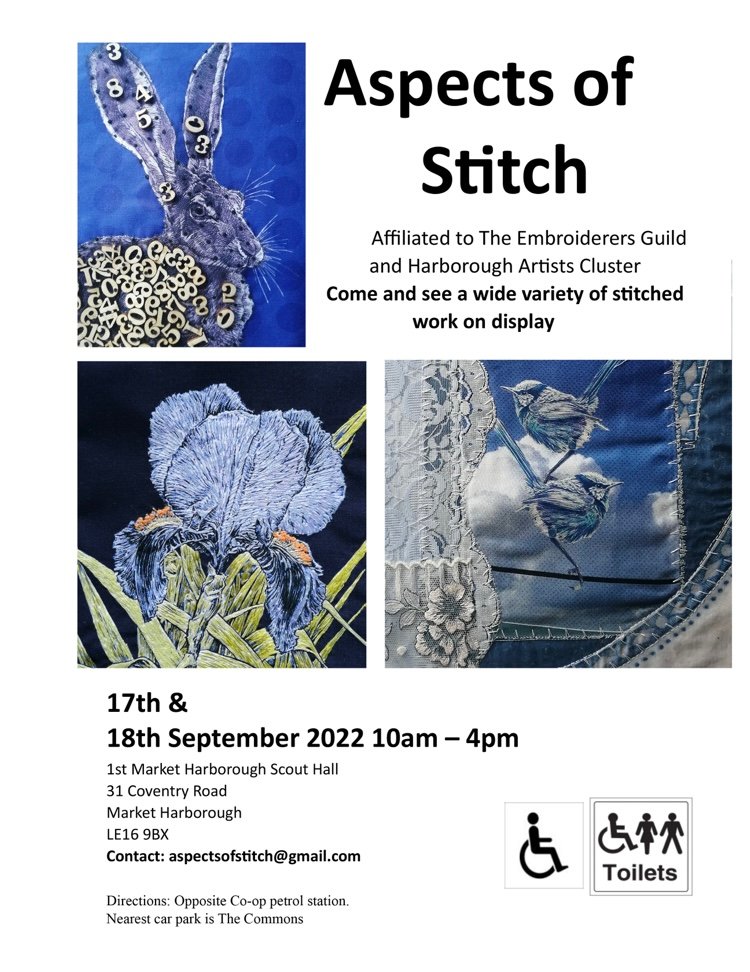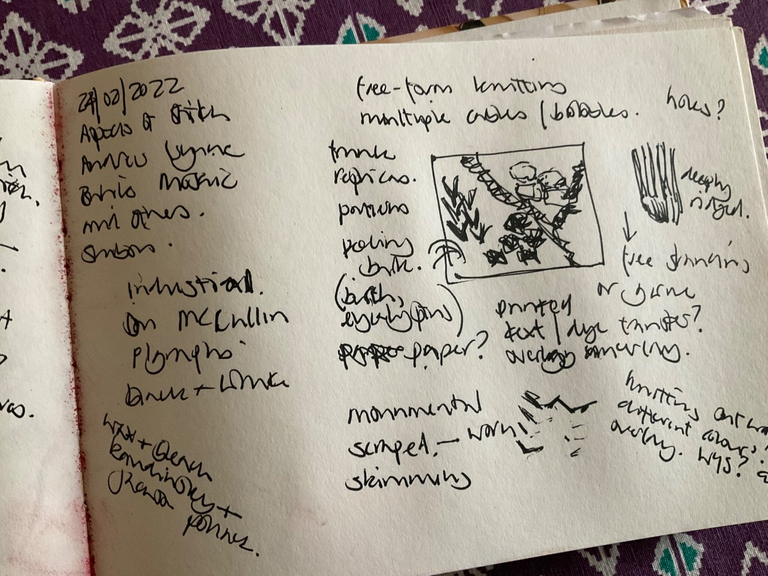#needleworkmonday | Ideas for a Peer Mentoring Project

Poster for this year's exhibition. Market Harborough is a lovely town to visit: independent shops, lots of interesting history, a fabulous museum, nice pubs, cafes and restaurants, pretty parks and a river. Usual budget hotels available, one in the town centre.
I was very taken when I learned that one of the visiting speakers to our sewing group belonged to a set of artists that had a mentor to help them develop their creative and professional practice:
The role of the mentor is to engage each practitioner in a dialogue with themselves - to propose not to impose. Rather than a full-stop, finished work is to be seen more as a comma, a pause for breath and reflection within the dialogue. (Source)
I'd also noticed that often conversations with other members before or after the formal part of our meeting each month sparked creative ideas for me. Somehow the person I was speaking to said or asked just the right thing and set me off on a journey. It was a little frustrating, though, because just as we were getting to the nub of the gist, someone would call time on our conversation as the speaker or workshop was about to start or I, keeping an eye on the time, had to run for my train.
I often feel quite stuck, not quite getting to where I want to go, and really, not quite knowing where I want to go. Looking back over past blog posts, I'm struck that I am often inspired by speakers, especially other creatives, and I can remember jotting and sketching in my notebook at the time, but those ideas are never developed (or even looked at again). Back at Easter, I went on a retreat that was intended to help you build your creative practice, which was very good, but didn't lead to a more structured approach to what I was doing.

A typical page of notes from a speaker, this time, Andrew Wynne. I'd forgotten I had done them until I was looking back over my posts.
I've written before about the Travelling Books, a project where participants are both enabled to develop their own practice through a series of monthly prompts and gift each other a resource book of design ideas and techniques inspired by the prompts at the end. I thought it would be good to participate in the next round, due to start in September, as this would provide a framework for regularly producing experimental work and building a portfolio of ideas over time.
Then I had an idea for a peer mentoring project that could follow similar principles to the Travelling Books: each participant would have the opportunity to mentor and be mentored by another participant in the project. It would be reciprocal where each person gives and receives but not necessarily co-mentoring where each person in a pair is mentoring the other. Nor would it work exactly like the Travelling Books, which is a rotation - you always receive a book from the same person, and always pass it onto the same person next on the list.
There are many ways it could work - pot-luck (names in a hat and you pull one out - that's your mentor), secret santa (everyone writes their interests and you sign up to your first three choices and everyone is assigned to one of their choices - sounds complicated but if you've been through voting for the Leader in any of our political parties, you'll know it's possible and you don't necessarily lose the will to live), or free choice, on a first-come, first-served basis.
There are many other ways, I'm sure.
The other two areas are the mentoring process itself and the substance, if you like, of the process. I was thinking, as I was writing this, that there is value for the mentor as well as the mentee of this process. By having the opportunity to help another person develop their thinking and ideas (and practice), the mentor is also extending their own learning and thinking: it's a mutual process.
For me, mentoring is a process of enquiry. It's about working with another person who helps you to articulate and extend your ideas and thinking and to develop your curiosity and skills of evaluation in order to build your confidence in your own judgment. And conversely, as a mentor, it's about working with another person, wherever they are starting, to help them explore and find their own way.
Turning to the substance, this could cover any and all the dimensions of the creative process from idea generation, sampling and refinement, research, context, materials, techniques, finishing, recording, evaluation and practice. There could be a basic structure to help mentor and mentee get the most from the process; alternatively, some pairs might find this too restrictive and reductive and prefer a more open, flowing conversation.
This also raises questions about how often, how long and how many times each pair would work together. Is it a once a year feature (maybe as part of the annual programme), where each pair meets the once only and next year there will be other pairings. Other options might be several paired meetings over the course of the year, or even working with the same person for a number of years.
All of these questions depend on what each person wants to achieve, where they are in their journey, their personality and how they like to learn. It's also about making the most of the richness of the members of the group - their different experiences, skills and outlook - and ensuring that as wide a range of needs as is practically possible are met, including ensuring that no members are disproportionately burdened and perceived as "the expert(s)". It's a shared thing where we all give.
This would all be voluntary and would depend on who was interested. If there were only a few people (or even only me), perhaps there would be other ways of doing it: maybe opening up the idea to other groups within a reasonable travelling distance or perhaps a small group that meets regularly to develop their practice.
I was reminded that writers often meet regularly to workshop each other's writing. In Leicester, we have closed and open creative writing groups. There is a closed group of poets which meets regularly and has done for many years, which could be very satisfying and perhaps builds more of a trust environment where people are more ready, over time, to take risks. There is also an open group for novelists that anyone can come to and listen and share. We might draw on some of those ideas.
I have said that I am happy to develop and co-ordinate a pilot for Aspects of Stitch and to take responsibility as the lead for this project, wherever it may go. I have mentored in another environment, not a creative one, but one that is dependent on creative thinking and working with people to assist them on their journey.
I would be interested in an open discussion about what value and opportunities something like mentoring might bring to Aspects to Stitch, perhaps starting from what challenges people have or experience and what they feel might help them and whether mentoring might be one of those things. Would mentoring someone else help to develop your own thinking and ways of working? What is mentoring not? What might be difficult in this process and how could we overcome that?
I have written this idea for a local group, but it may also be something that members of NeedleWorkMonday are interested in doing, too. Let me know in the comments!
Or there is always the rubber duck method.



Hi @shanibeer,
Thank you for participating in the #teamuk curated tag. We have upvoted your quality content.
For more information visit our discord https://discord.gg/8CVx2Am
I value mentorship in life because it helps me grow in knowledge through research. I will be considering whether to participate in this since you're the key mentor in the program.
Hello @apunawu,
Thank you for coming back to me. The proposal I have written is for my local group - I've offered to lead the project for them.
If members of NeedleWorkMonday wanted to do something similar, there would need to be a group of interested people to make it work and, although I would be happy to contribute, others would have to lead.
It's good to know that you've found mentoring useful.
!CTP
I hope that one day something good like that will happen in NeedleWorkMonday.
😍
I love all handmade stuff and one of them sewing. I believe in the past we did more ourselves, nowadays it is easy and quick to buy. I am not sewing anymore but love knitting still.
😍
!CTP